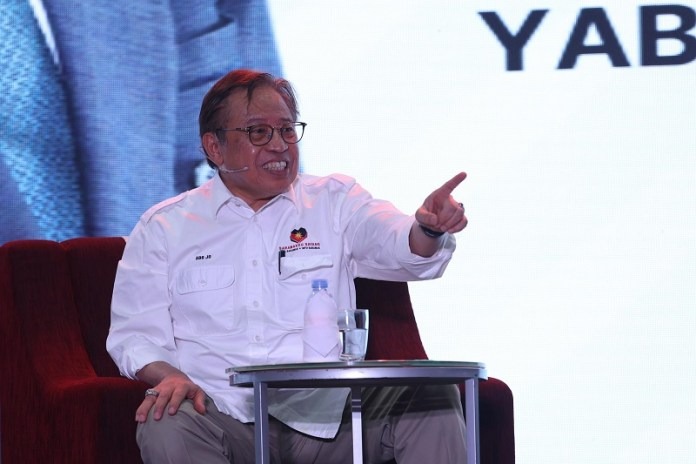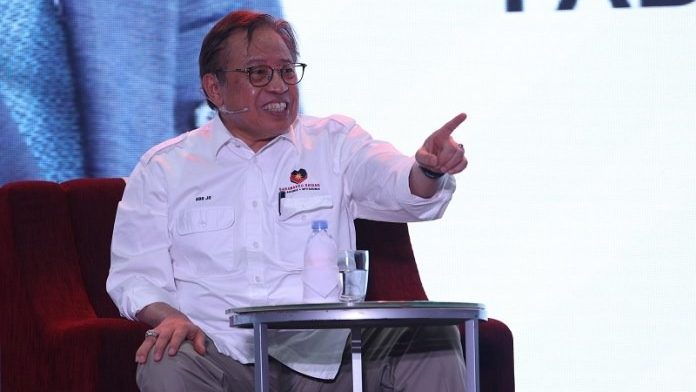KUCHING, Oct 19: Sarawak is forging ahead with a bold move to fund its own high-yield paddy cultivation projects with RM500 million, following the absence of financial support in the recently announced National Budget 2025. The Premier of Sarawak, Datuk Patinggi Tan Sri Abang Johari Tun Openg, expressed disappointment that federal funds were not allocated for Sarawak’s agricultural initiatives but remained steadfast in pushing forward.

During a townhall session as part of the annual Lan Berambeh event, held at the Malaysia International Trade and Exhibition Centre (MITEC) in Kuala Lumpur, Abang Johari voiced his frustration at the lack of federal recognition for the state’s food security projects.
“I had hoped for a budget allocation for Sarawak’s paddy cultivation projects. But kalau nadai, sik apa lah (Since there is no budget, it’s okay). Sarawak will use its own resources for our rural farmers to plant paddy,” he said. His remarks were broadcast live via the Ukas Channel to Sarawakians across the nation.
This homegrown effort to develop drainage and irrigation infrastructure for paddy cultivation will be part of Sarawak’s Budget 2025, which is slated to be tabled in the upcoming Sarawak Legislative Assembly Sitting in November.
Sarawak’s Agricultural Strategy: Pushing for Self-Sufficiency
The Premier’s announcement comes at a crucial time when Sarawak is striving to increase self-sufficiency in rice production. Currently, the state produces only 30 per cent of its rice needs, with the remaining 70 per cent being imported. Abang Johari highlighted that Sarawak has the potential to meet its own rice consumption demands with the abundant resources available, from water and fertile land to modern technology.
“Is Sarawak not capable of producing our own rice when we have an abundance of resources from water to land and technology?” he questioned.
To address this imbalance, the state has embarked on high-yield paddy cultivation projects. A pilot project launched earlier this year has already proven to be a success, producing an impressive eight tonnes of rice per hectare. The Premier’s goal is to extend this success by cultivating 20,000 hectares of land to yield 240,000 tonnes of rice annually by 2030, which would comfortably meet Sarawak’s consumption needs.
Disparity in National Budget Allocation
Meanwhile, in contrast to Sarawak’s exclusion from federal funds, the National Budget 2025, presented by Prime Minister Datuk Seri Anwar Ibrahim, allocated nearly RM1 billion for a five-season paddy planting project under the Muda Agriculture Development Authority (MADA). This project will cover 11,000 hectares over two years, with a focus on boosting paddy production.
The exclusion of Sarawak from this allocation raised eyebrows, especially as food security remains a pressing issue not only nationally but also globally. Abang Johari stressed the importance of technology in ensuring productivity without overburdening farmers, a key component in Sarawak’s agricultural strategy.
“The use of high technology enables us to develop other critical sectors, especially agriculture, as food security remains a global issue. Let Sarawak be the producer of food,” he asserted.
By implementing cutting-edge technology in irrigation and cultivation, the Premier is confident that Sarawak can make a significant contribution to the nation’s food supply and secure its own food independence.
Moving Forward with Sarawak’s Vision
Despite the lack of federal backing, Abang Johari’s vision for Sarawak remains undeterred. He sees the development of paddy cultivation as not just an agricultural initiative but a pathway to economic resilience for the rural communities of Sarawak.
The RM500 million investment into paddy irrigation and drainage infrastructure is set to transform the state’s rural farming landscape, empowering farmers to meet the state’s growing demand for rice and contribute to the nation’s food security.
This homegrown initiative signals Sarawak’s determination to chart its own path in agricultural development, one that leverages its natural resources, adopts modern technologies, and strives for self-sufficiency.
Among those present at the Lan Berambeh townhall session were Deputy Prime Minister Dato Sri Fadillah Yusof and Sarawak Deputy Premier Datuk Amar Dr Sim Kui Hian, who supported the Premier’s bold decision to proceed with the state’s paddy cultivation projects without federal aid.
As Sarawak moves forward, it continues to demonstrate its capability to innovate and lead in sustainable agriculture, setting an example for other regions in Malaysia. The state’s focus on food security, supported by modern technology, promises a brighter, more self-reliant future for Sarawak’s agricultural sector.


